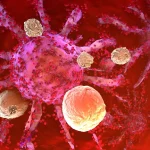For any questions:
The following statistics are projections based on statistical data from 2019 for new cancer cases and 2010 for mortality.
The number of cancer cases is on the rise
In 2023, 67,548 Quebecers were expected to be diagnosed with cancer, which represents 185 new cases every day. This number has been increasing for several years and is expected to increase even more in the years to come. It is the result primarily of aging and population growth. It is also estimated that in 2023, 22,500 people in the province died of cancer, at a rate of 62 deaths per day.
This means that on average in Quebec, someone learns that they have cancer every 8 minutes. Every 23 minutes, someone dies of it. In fact, cancer is the leading cause of death in Quebec, ahead of cardiovascular disease.
Despite the increase in the number of cancer cases, the mortality rate from the disease has decreased by 26% among women and by over 39% among men in Canada since 1988. Overall, for all cancers combined, the net 5-year survival rate increased from 55% in the early 1990s to about 64% in 2023. These advances are linked to improvements in cancer screening practice, advances in treatment and to some lifestyle changes, including reduced tobacco use. Measures such as quitting smoking, eating well, being physically active and protecting yourself from the sun can go a long way towards reducing your risk of cancer.
Cancer in Quebec
In Quebec:
- Lung cancer is the type of cancer most often diagnosed in men
- Breast cancer is the type of cancer most often diagnosed in women
- Lung and bronchus cancer is the leading cause of cancer death in both men and women
We estimate that in 2023 :
- 7,089 men were diagnosed with prostate cancer
- 5,427 men were diagnosed with lung cancer
- 4,176 men were diagnosed with colorectal cancer
- 9,559 women were diagnosed with breast cancer
- 6,047 women were diagnosed with lung cancer
- 3,237 women were diagnosed with colorectal cancer
And :
- 3,300 men died of lung and bronchus cancer
- 1,400 men died of colorectal cancer
- 1,050 men died of prostate cancer
- 2,800 women died of lung and bronchus cancer
- 1,400 women died of breast cancer
- 1,150 women died of colorectal cancer
Usefulness and limitations of statistics
Statistics are tools that are designed to illustrate data related to a given population and not to illustrate the particular situation of an individual. They can therefore be used to:
- Describe the health status of a population
- Evaluate a test, treatment, or therapeutic trial
- Look for and identify causal factors
- Assess the quality and control of certain practices
- Assess and establish the health care economic system
- Illustrate the probability of healing, remission or recurrence
However, statistics can’t be interpreted as individual predictors of cure, remission or relapse; they are not certainties.
We can’t base the chances of recovery from cancer on statistics. There are many variables to consider, such as the type of cancer, its location, the stage of the disease and the response to treatment.
To learn more about the various topics related to cancer, please contact our Info-cancer Hotline at 1 800 363-0063. A specialized oncology nurse will listen to you, answer all your questions and give you the support you need.
Sources:
Statistiques du Registre québécois du cancer
Tableau de bord des statistiques canadiennes sur le cancer
Consult our Library to find publications on this topic that you can borrow free of charge.



































